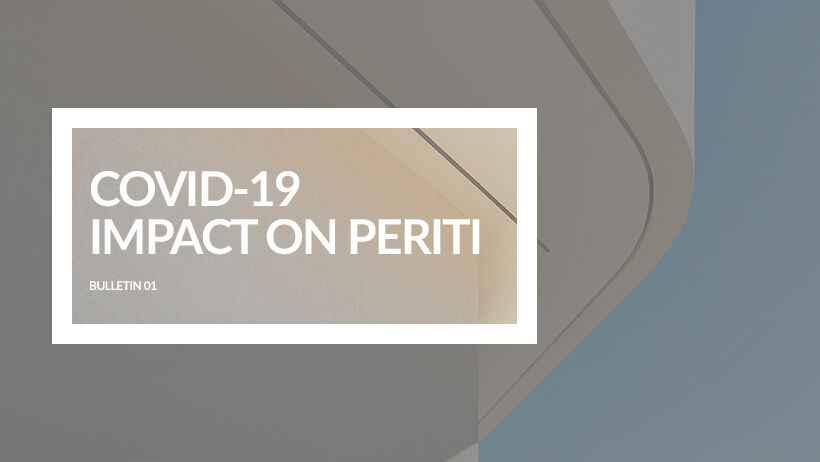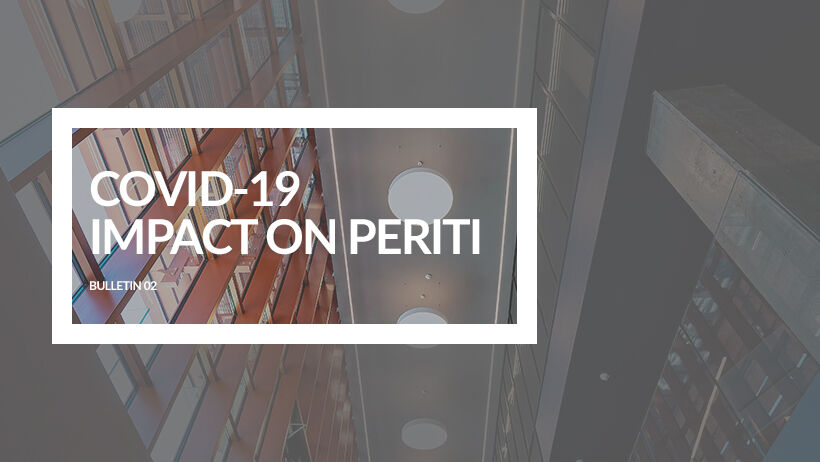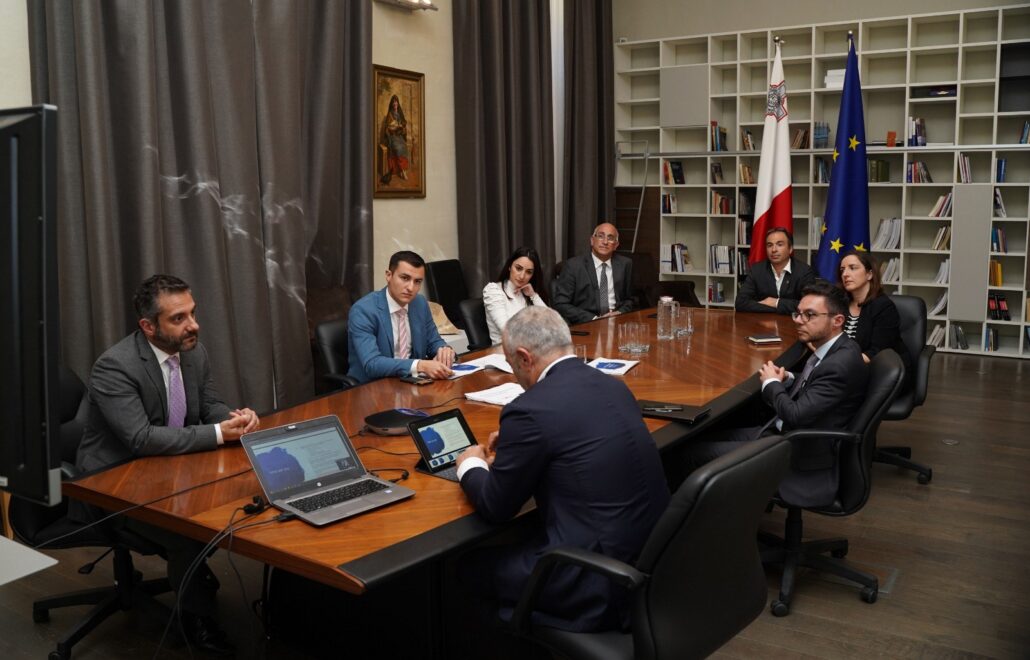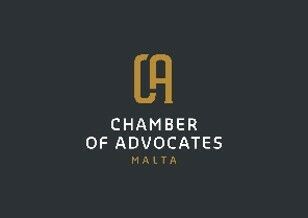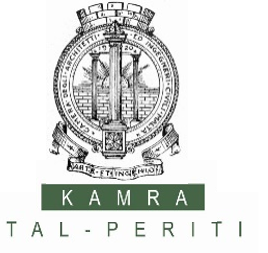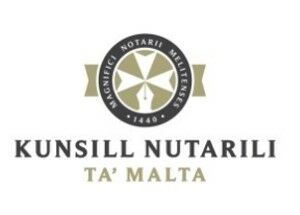CIR 10/20 | COVID-19 – We are not Immune // Update 5
This Circular is being issued to update you on a number of actions taken by the Kamra tal-Periti in the past couple of weeks, namely:
- Survey of the profession
- Submission of proposals for a National Strategy for economic measures
- Economic measures currently applicable for periti
- Safety on construction sites in view of COVID-19
Further details on each of these points are outlined below.
1. Survey of the profession
The outcome of the first two surveys of the profession carried out last month were instrumental in our discussions with Government on the difficulties being experience by periti, as further outlined below. The results of those surveys have been published in our COVID-19 Impact on Periti Bulletin 01 and Bulletin 02.
The third round of the survey is now open until Friday 10th April 2020 at noon. Before commencing the survey you will need to have the following information at hand:
- Number of staff you employ, split by provenance (Maltese, EU, and non-EU) and gender
- Number of open sites under your direction split by predominant activity (demolition and site clearance, excavation, construction and finishes/services, and the number of those which pose risks of danger and/or damage to third parties if the works are stopped suddenly in the eventuality of a lockdown.
- Average monthly turnover for 2019, and turnover for January, February and March to date (questions in this section request details in % terms but you will need the raw data to work these out)
Your response is highly important, even if you have already participated in previous rounds, since it will enable us to report trends in the profession to Government. I urge you to dedicate some time to this exercise to ensure that our data will be as representative of the profession as possible.
2. Submission of proposals for a National Strategy for economic measures
Over the past three weeks, the Kamra tal-Periti met with four other professional bodies, practically on a daily basis, to discuss how the outbreak of the COVID-19 pandemic has affected their professional activities and those of the significant number of persons working within those professional practices.

The Kamra tal-Periti, the Chamber of Advocates, the Dental Association of Malta, the Kunsill Notarili ta’ Malta and the Malta Institute of Accountants share the firm belief that our professions form an integral part of the community we live and practice in, and that we have a duty to contribute our experience and expertise towards a balanced solution to the economic issues being faced by the country as a whole.
On Wednesday 1st April 2020, representatives of each of the professional bodies met with Minister Silvio Schembri and presented our proposals for:
- a National Strategy for economic measures to be considered by Government in addressing the severe economic and social difficulties that have been brought about by the COVID-19 outbreak; and
- a set of measures aimed at assisting our professions within the context of the national strategy proposed.
It is evident from the surveys carried out by the professional bodies among their members that, whilst the full extent of the impact going forward is as yet unknown, the immediate impact has been severe and the outlook bleak. If this situation were to be prolonged, it will place self-employed professionals under significant pressure to meet their payment obligations and will place firms under severe pressure with under-utilised human resources to meet their significant salary bills.
In our proposals to Government, we acknowledged that there are economic sectors in the country that can be considered as “higher impact” and that any economic measures of state intervention are to prioritise those sectors; indeed we concurred with the strategy of Government to do so, however cautioned that the professions are not immune to this environment.
The six measures proposed to Government specifically for the professions can be found in this presentation.
Minister Schembri was receptive to the proposals and indeed he expressed agreement in principle with the submissions made. The issue of debate is really how and when would be the right time to implement them, given that Government had to prioritise other sectors with urgency since the difficulties in those were more pronounced. The Minister also stated that in any event these measures cannot be adopted across the board within professions, and that even within the same profession one would have to make the case that assistance was necessary.
Any scheme that will be in place would need to have sufficient flexibility to enable it to be applied on a case by case basis, taking into account, within each profession, who required the assistance most. Not all periti are in the same boat, and some would require assistance more than others, or indeed before others. In this context he reiterated his agreement in principle with the proposals and directed the professions to make further representations with the Ministers responsible for their respective professions.
In fact, we have written to the Minister for Transport, Infrastructure and Capital Projects, under whose remit the profession falls, requesting a meeting wherein we shall be stressing the importance of the introduction of these measures to give assurance to our profession that assistance will be available at the right time and in the right measure.
3. Economic measures currently applicable for periti
On Monday 6th April 2020, Minister Schembri confirmed that, as a first step, Government will be extending the possibility of postponement of taxes to those professionals who can genuinely show that they are in difficulty of paying such dues. This was the first of the six proposals submitted by the professional bodies. Further details on this scheme can be accessed below.
The impacts on the construction industry are evident, and a slowdown is clearly taking place. Loss of revenue, and a reduction in new projects coming on line are already being reported, and the situation is expected to decline further in the coming weeks. In other cases, periti who fall within the vulnerable groups as defined by Legal Notice 111 of 2020 will also experience a decline in revenue, and consequently difficulty with paying their employees and expenses.
Accordingly, those periti who have suffered a significant drop in revenue, and who are unable to meet the salary costs of their office, have an arguable case to make, even now, without having to wait for any particular scheme or measure to be announced, to qualify for certain assistance packages that have already been announced. This was made clear during the meeting with Minister Schembri, and any periti in such situations should therefore make their case to Malta Enterprise and apply for support.
We understand that where a reasonable case can be made, Malta Enterprise will give such cases due consideration. Evidently, each case will be evaluated on its own merits and the relief granted will be a function of proportionality to the difficulties faced by the professional concerned. Various measures may be considered, including reduced working hours, however these would need to be assessed on a case by case basis with Malta Enterprise.
Those who apply for relief and assistance are urged to inform the Kamra tal-Periti that they have done so, in order that such cases may be followed up from our end.
Meanwhile, kindly note that we shall be communicating with you shortly regarding a Q&A session being planned to address any queries you may have on the above.
4. Safety on construction sites in view of COVID-19
Another major concern at this time is the safety of workers and professionals on construction sites in terms of potential exposure to the virus, as well as the safety of third parties. The recent increase in case numbers is surely not to be ignored. We are scheduled to meet the Authorities later this week, and will inform you accordingly on any measures to be implemented in this respect.
I cannot emphasise enough how important it is for you to keep in touch with us via email on info@kamratalperiti.org, the Periti Discussion Group on Facebook, and Facebook Messenger, and to participate in the regular surveys being carried out.
Meanwhile, we will continue focussing all of our attention on ensuring that we pull through the current crisis together.
Yours sincerely,
Simone Vella Lenicker
President

